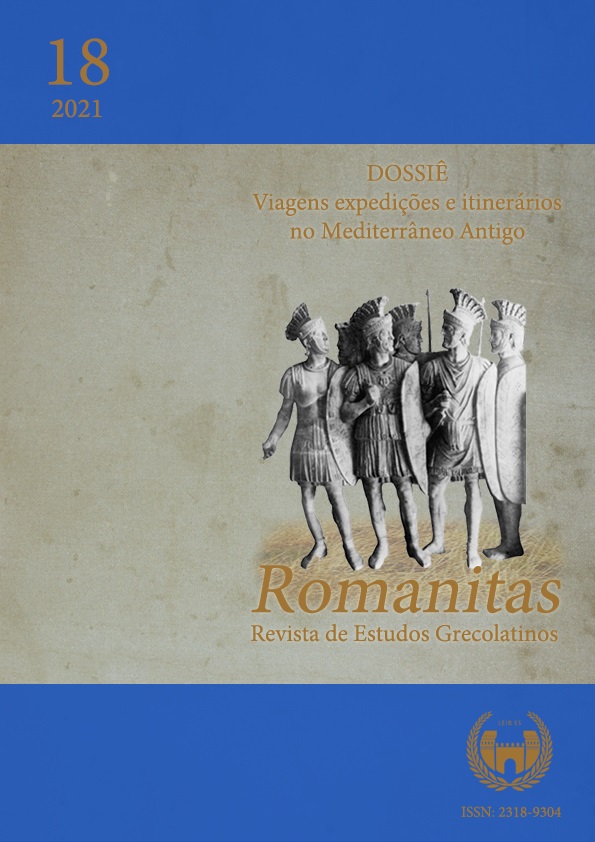Women traveling in the roman world (4th-5th century AD)
DOI:
https://doi.org/10.17648/rom.v0i18.36179Keywords:
Roman Women, Travels, Spatialities, MemoryAbstract
This article is about the women’s travels who lived between the 4th and 5th century AD. The study analyzes the issue of displacement to the Holy Land through the Itinerarium Burdigalensis and then seeks to understand the discourse about four women who traveled to Palestine. Helena, mother of Emperor Constantine, Egeria the pilgrim who wrote his travel diary and two Roman matrons Paula and Melanie who not only decided to travel, but also acted in a unique way, living in new places, building and interfering in the landscape with the building of monasteries, assistance to pilgrims, etc. Finally, understanding how the memory of these travelers contributes to feed a collective imagination, because the trip provides an identity to the territory and, also for the traveler herself, who makes her journey a fundamental element of her life, in this sense, the trip is much more than a metaphor for expanding new horizons, it is a practice of alterity.
Downloads
References
Documentação textual
BÍBLIA DE JERUSALÉM. Tradução de Ivo Storniolo e José Bortolini. São Paulo: Paulus, 2002.
EGERIA. Diario di viaggio. Introduzione e note di Elena Giannarelli. Milano: Paoline, 2010.
EGÉRIA. Viagem do Ocidente à Terra Santa, no séc. IV. Edição de Alexandra B. Mariano e Aires A. Nascimento. Lisboa: Colibri, 1998.
EUSEBIO DI CESAREA. Vita di Costantino. Traduzione di Laura Franco. Milano: BUR-Rizzoli, 2009.
GEYER, P. (ed.). Itinerarium Burdigalense. In: ________. Itineraria Hierosolymitana: saeculi IIII-VIII. Pragae, Vindobonae et Lipsiae: Academia Litterarum Caesareae Vindobonensis, 1898. v. XXXVIIII.
HIERONYMI. Epitaphium Sanctae Paulae. Traduzione di Luca Canali. Trebaseleghe: Fondazione Lorenzo Valla, 2007.
ITINERARIUM BURDIGALENSE UEL HIEROSOLYMITANUM. Recensire di Gustavo Althoff. Scientia Traductionis, n. 15, p. 274-379, 2014.
PAULINO DI NOLA. Le lettere. Traduzione di Giovanni Santaniello. Nápoles: LER, 1992.
RUFINO. Storia della Chiesa. Traduzione di Lorenzo Dattrino. Roma: Cittá Nuova, 1997.
TEODORETO DE CIRO. Storia ecclesiastica. Roma: Cittá Nuova, 2000.
Obras de apoio
ADICHIE, C. N. O perigo de uma história única. São Paulo: Companhia das Letras, 2019.
BROWN, P. Per la cruna di un ago: la ricchezza, la caduta di Roma e lo sviluppo del cristianesimo, 350-550 d.C. Torino: Einaudi, 2014.
CERTEAU, M. A invenção do cotidiano. Petrópolis: Vozes, 2009.
CONSOLINO, F. E. E., la locandiera. In: FRASCHETTI, A. (org.) Roma al femminile. Roma: Laterza, 1994, p. 187-212.
CONSOLINO, F. E. E. De stercore ad regnum. In: ENCICLOPEDIA COSTANTINIANA SULLA FIGURA E L’IMMAGINE DELL’IMPERATORE DEL COSIDDETTO EDITTO DI MILANO 313-2013. COSTANTINO I. Roma: Istituto della Enciclopedia Italiana Treccani, 2013, p. 117-131. 1 v.
DRIJVERS, J. W. Helena Augusta, the cross and the myth: some new reflections. In: BRANDES, W. (ed.), Millennium 8: yearbook on the culture and history of the first millennium CE. Berlin: De Gruyter, 2011, p. 125-174.
DRIJVERS, J. W. Helena Augusta: the mother of Constantine the Great and the legend of her finding of the true cross. Leiden: Brill, 1992.
ELSENER, J. The ‘Itinerarium Burdigalense’: politics and salvation in the geography of Constantine’s Empire. The Journal of Roman Studies, v. 90, p. 181-195, 2000.
GIROTTI, B. Paola omnium romae matronarum exemplum. Bologna: BradDypUS Editore, 2014.
HARTOG, F. Memória de Ulisses: narrativas sobre a fronteira na Grécia antiga. Belo Horizonte: Editora da UFMG, 2004.
HUNT, E. D. Holy land pilgrimage in the Later Roman Empire AD 312-460. Oxford: Clarendon Press, 1984.
LENSKI, N. Empresses in the Holy Land: the creation of a Christian utopia in Late Antique Palestine. In: ELLIS, L.; KIDNER, F. L. (ed.). Travel, communication and geography in Late Antiquity: sacred and profane. Alsershot: Ashgate, 2004, p. 113-124.
LEYERLE, B. Landscape as cartography in Early Christian pilgrimage narratives. Journal of the American Academy of Religion, v. 64, n. 1, p. 119-143, 1996.
MORESCHINI, C., NORELLI, E. História da literatura cristã antiga: grega e latina. De Paulo à Era Constantiniana. São Paulo: Loyola, 2014.
SANTI, C. Aspetti degli itinerari religiosi nel mondo classico. In: AAVV. I pellegrinaggi nell’età tardoantica e Medievale: Atti del Convegno Ferentino 6-8 Dicembre 1999. Roma: Tipografia Neri Claudio, 2005, p. 30-56.
SERRANO, S. Mulheres viajantes. Lisboa: Tintas da China, 2014.
SESSA, K. Daily life in Late Antiquity. Nova York: Cambridge University Press, 2018.
SIQUEIRA, S. M. A. Helena, Constantina e Gala Placídia: mausoléus e redefinição dos espaços sagrados na cidade antiga (séc. IV-V) d.C. In: SILVA, G. V.; SILVA, É. C. M.; LIMA NETO, B. M. (org.) Espaços do sagrado na cidade antiga. Vitória: GM, 2017, p. 314-333.
SIQUEIRA, S. M. A. Melânia: de dǒmĭna a serva de Cristo. Representações de mulheres aristocráticas no Cristianismo (séc. IV-V d.C.). In: ZIERER, A.; VIEIRA, A. L. B. (ed.). História antiga e medieval: conflitos sociais, guerras e relações de gênero – representações e violência. São Luís: Eduema, 2017, p. 135-154.
SIQUEIRA, S. M. A. Representações espaciais da Terra Santa no “diário de viagem” de Egéria: o olhar de uma peregrina cristã no século IV. In: SILVA, G. V.; SILVA, É. C. M.; LIMA NETO, B. M. (org.) Usos do espaço no mundo antigo. Vitória: GM, 2018, p. 316-331.
Downloads
Published
How to Cite
Issue
Section
License
Copyright (c) 2021 Silvia M. A. Siqueira

This work is licensed under a Creative Commons Attribution-NonCommercial-NoDerivatives 4.0 International License.
a. The authors retain copyright and grant the journal the right to first publication.
b. The authors are authorized to assume additional contracts separately, for non-exclusive distribution of the version of the work published in this journal (e.g., publishing in institutional repository or as a book chapter), with acknowledgment of authorship and initial publication in this journal.
c. Authors are allowed and encouraged to publish and distribute their work online (e.g. in institutional repositories or on their personal page) after the first publication by the journal, with due credit.
d. The journal's texts are licensed under a CC BY 4.0 Deed Attribution 4.0 International Licence (CC BY).




























